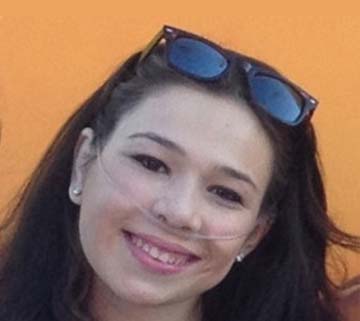‘The Art of Dying’ Explores Approaches to Dying
NY – Melanie Chaite has had many brushes with death. In 21 years of living with lymphangiomatosis, a rare cancer-like progressive lymphatic disorder that she’s had since birth, bouts of severe pneumonia have left her in intensive care. She’s had swine flu and emergency surgery for a collapsed lung. Fluid that has built up around her right lung currently threatens to stop her heart. She undergoes regular chemotherapy, and has tubes up her nostrils to provide the extra oxygen she needs to live. A full-body pain that she describes as “beyond tremendous” has become normal.
“I have accepted the fact that I’m going to die at a young age. And I’m okay with that,” said Chaite, who lives in Roselyn on New York’s Long Island, and is a New York University student on what seems to her like a permanent medical leave. “But even though I have accepted it, there are moments when I get scared. Is it going to hurt when I die?
“People always worry about my health. To know they will grieve makes me feel like I need to help prepare them.”
This weekend, as part of that preparation, Chaite is attending the Art of Dying conference in Manhattan, exploring death and what comes after. During three days of presentations and workshops, professionals whose areas of expertise range from neurosurgery and psychotherapy to being end-of-life doulas and Buddhist teachers will discuss a topic often confined to academic gatherings and private conversations.
“I want to learn more about the process and the spiritual aspect,” said Chaite, who is volunteering at the event with her mother in order to get a discount on the $595 tickets.
The Art of Dying, which kicked off Friday morning with two daylong seminars — one taught by psychotherapist Thomas Moore about “alternative ways to know about life and death” and another led by Henry Fersko-Weiss, president of the International End-of-Life Doula Association — is organized by the Open Center. The Manhattan holistic education and practice-focused nonprofit opened in 1984, when its now-ubiquitous urban yoga studio was a rarity. It’s best known for its classes and certification programs, which cover topics ranging from how to use essential oils in medicinal treatment to holistic psychology.
The Art of Dying Conference, now in its fifth iteration, was first held in 1995 with about 100 people intimately involved in the field of spirituality and research around death. It was co-sponsored then by the Tibet House, the cultural organization co-founded and currently led by Robert Thurman, a Buddhist and Columbia University professor who is one of the speakers this weekend. At the time, “it seemed like the culture was changing its approach to dying,” said Open Center co-founder Ralph White. “A year earlier, Jackie Kennedy Onassis had chosen a death with dignity at home rather than being hooked up to machines at the hospital.”
With the growth of activism and education around the topic of death, such as through death cafes and a flurry of TV shows and documentaries, White said increased interest has spurred the Open Center to plan more frequent conferences and to offer a certificate program in the Art of Dying.
This year, 300 people are expected for the event. Among the speakers is Eben Alexander, the neurosurgeon whose story of being a doubter-turned-believer in near-death experiences after having one his own was chronicled in his bestselling book, Proof of Heaven: A Neurosurgeon’s Journey into the Afterlife. There’s also Frank Ostaseski, who co-founded the Zen Hospice Project, the first Buddhist hospice in the U.S., in 1987.
On Saturday afternoon, Therese Schroeder-Sheker, one of the pioneers of music thanatology, will talk about Chalice of Repose Project, her effort to “lovingly care for the physical and spiritual needs of the dying with prescriptive music.” (Schroeder’s instrument of choice is the harp.)
“Going to a conference like this is life-affirming,” said Wendy Chaite, Melanie’s mother. “I hope it will be a place where I can affirm that I’m on the right path and doing the right thing. I hope I can gain some new skills, even if its just a subtle small thing.”
Wendy Chaite began volunteering at the Open Center 2 1/2 years ago, when her daughter’s health was particularly unstable. She enrolled in its classes on the mind-body-spirit connection and positive psychology, and took to meditating.
“What I began to recognize in her suffering and my suffering and my family’s is that space between what you expect for the future and what was in the past — that space between causes suffering,” said Wendy Chaite, who founded the Lymphatic Education and Research Network before leaving the job to care for her daughter full time. Last summer, she began working again as the director of career and personal development at the Maurice A. Deane School of Law at Hofstra University. “I’m no longer in fear of my daughter’s death, or my own,” she said.
It’s that kind of outlook that Open Center president Thomas Amelio said he hopes attendees take from the weekend.
“It used to be that this role of talking about death was solely filled by religion, but nowadays many people aren’t as focused on organizational religion that gives them answers. They have inquiries,” said Amelio. “We want to gather the community to best explore the different questions about death. We’re not presenting anybody as having the answers, but want to gather the best people who are in deep inquiry.”
“After all, death affects everybody.”
Originally published by the Huffington Post, author Jaweed Kaleem.


Leave a Comment
You must be logged in to post a comment.